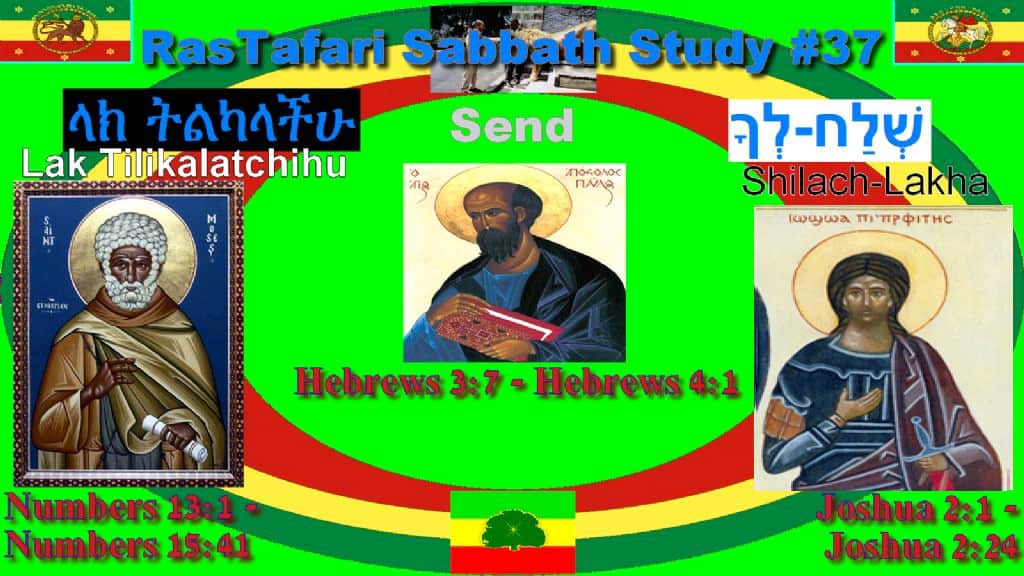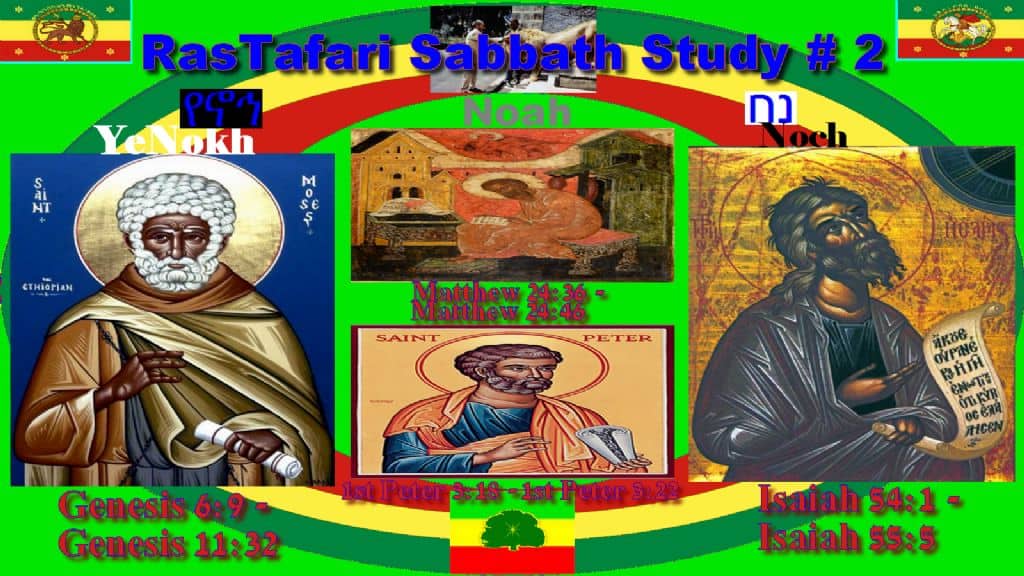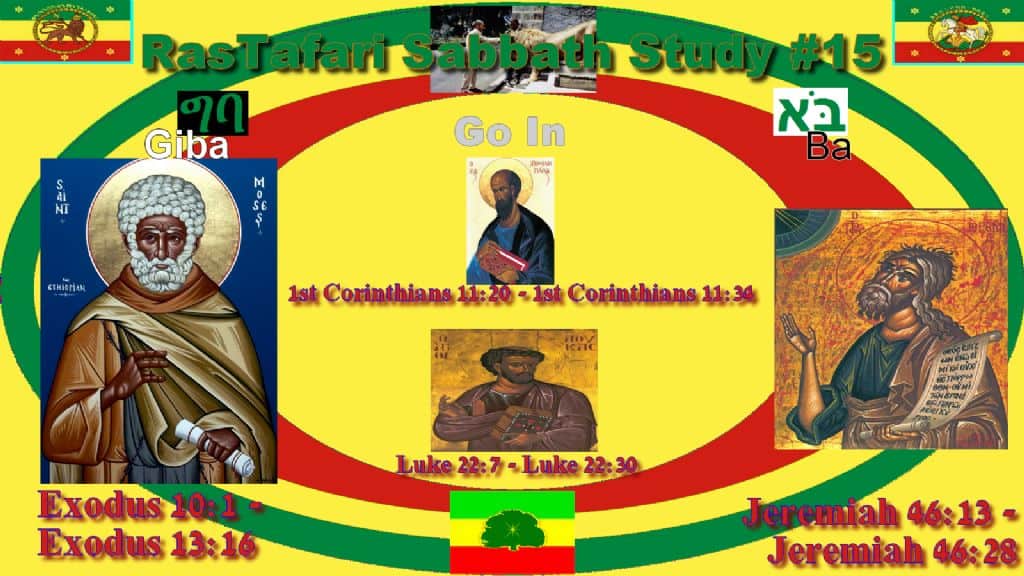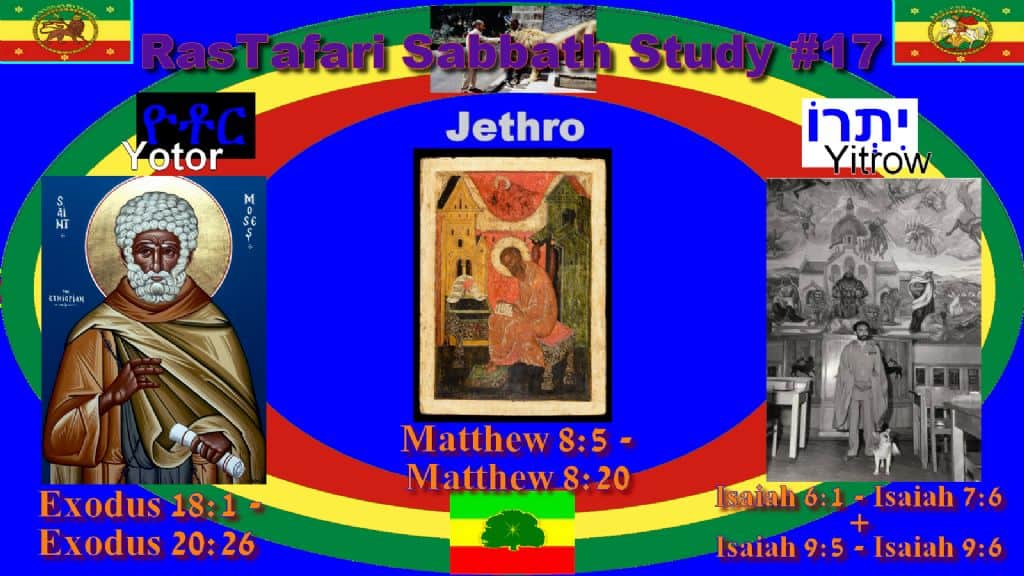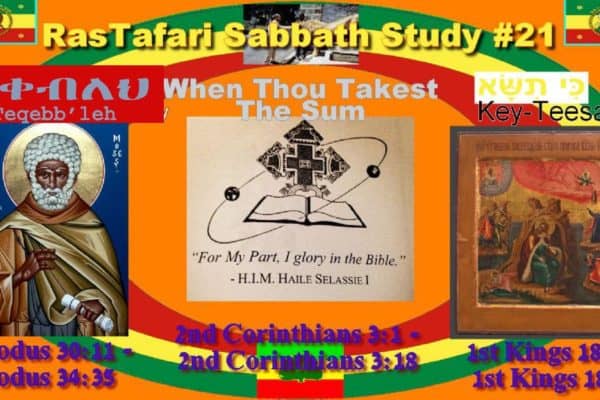This Week's Portion #22-23
Vayakhel/Pekudei | ויקהל/פקודי | "And he assembled- He gathered/Accountings of- Countings" ሰብስቦ | seb’s’bo [sebissibo]/እቃ ድምር ይህ ነው | ‘Iqa d’m’r [y’h’new]
*For a PDF version of All the Torah Portions Schedule, click here to download!
1. Torah Reading
Exodus 35:1-38:20 / Exodus 38:21-40:38
- 1.1First reading — Exodus 35:1–20
- 1.2Second reading — Exodus 35:21–29
- 1.3Third reading — Exodus 35:30–36:7
- 1.4Fourth reading — Exodus 36:8–19
- 1.5Fifth reading — Exodus 36:20–37:16
- 1.6Sixth reading — Exodus 37:17–29
- 1.7Seventh reading — Exodus 38:1–20
------------------------------------
2. Prophets Reading
1 Kings 7:40-50 / 1 Kings 7:51-8:21
3. New Testament Reading
2 Cor 9:6-11; 1 Cor 3:11-18 / 1 Cor 3:16-17; Hebrews 13:10
Portion Outline - TORAH
- Exodus 35:1 | Sabbath Regulations
- Exodus 35:4 | Preparations for Making the Tabernacle
- Exodus 35:20 | Offerings for the Tabernacle
- Exodus 35:30 | Bezalel and Oholiab
- Exodus 36:8 | Construction of the Tabernacle
- Exodus 37:1 | Making the Ark of the Covenant
- Exodus 37:10 | Making the Table for the Bread of the Presence
- Exodus 37:17 | Making the Lampstand
- Exodus 37:25 | Making the Altar of Incense
- Exodus 37:29 | Making the Anointing Oil and the Incense
- Exodus 38:1 | Making the Altar of Burnt Offering
- Exodus 38:9 | Making the Court of the Tabernacle
- Exodus 38:21 | Materials of the Tabernacle
- Exodus 39:1 | Making the Vestments for the Priesthood
- Exodus 39:32 | The Work Completed
- Exodus 40:1 | The Tabernacle Erected and Its Equipment Installed
- Exodus 40:34 | The Cloud and the Glory
Portion Outline - PROPHETS
- 1 Kings 7:13 | Products of Hiram the Bronzeworker
Portion Study Book Download & Summary
SHEMOT Hebrew Book of Exodus - Torah Portion Vol.2 (FREE PDF)
Vayakhel
The twenty-second reading from the Torah and the second-to-last reading from the book of Exodus is called Vayakhel (ויקהל), which means “and he assembled.” The name comes from the first words of the first verse of the reading, which could be literally translated to read, “And Moses assembled all the congregation of the sons of Israel ...” (Exodus 35:1). This portion from the Torah describes how the assembly of Israel worked together to build the Tabernacle. In most years, synagogues read Vayakhel together with the following portion, Pekudei.
Pekudei
The twenty-third reading from the Torah and last reading from the book of Exodus is called Pekudei (פקודי), which means “Accounts.” The first words of the first verse of the reading could be literally translated to read, “These are the accounts (pekudei) of the Tabernacle” (Exodus 38:21). The last reading from Exodus begins with an audit of how the contributions for the Tabernacle were used. The portion goes on to describe the completion of the Tabernacle and its assembly and concludes by depicting the glory of the LORD entering it. In most years, synagogues read Pekudei together with the previous portion, Vayakhel; therefore, the comments on this week’s reading will be brief.
Portion Commentary - Vayakhel
Torah with an Occupation
Thought for the Week:
When the people of God join together with a common goal, we can do great things. The joint effort of the people of God working together to fulfill His commandments created a spiritual house worthy of God’s Dwelling Presence.
Commentary:
And all the skillful men who were performing all the work of the sanctuary came, each from the work which he was performing. (Exodus 36:4)
The building of the Tabernacle required each person to contribute to the work from his own skill set. The tanners did the tanning, weavers did the weaving, carpenters did the carpentry, metal smiths did the smithing and so on. Each person had something to offer from his own unique vocational skills.
The Torah life is not just a life of religious rituals and scripture study. God encourages all of us to develop our own unique vocational skills so that we can each be self-sufficient and contribute to the common good of the community. Paul instructs each believer to lead a quiet life, attending to his vocation, working with his hands so that he may win the respect of those outside the community and not be dependent upon anyone.1 He teaches us to find some productive field of work so that we will have adequate resources to share with others who might be in need.2 These guidelines teach us that making a living is part of living out Torah. The early rabbis agreed with these sentiments. Consider the following rabbinic quotation from the Mishnah about the value of combining Torah study with an occupation:
The study of Torah is excellent when it is combined with a worldly occupation because the effort required by both keeps sin out of a person’s mind. But where there is no worldly occupation the study of Torah amounts to nothing and leads to sin. Let everyone who works in the community work for the sake of the Name of Heaven. (m.Avot 2:2)
According to this view, a person should always combine his pursuit of spirituality with the pursuit of an income. To concentrate solely on religious matters is out of balance and will eventually lead to ruin. Instead a person should regard his job a religious duty performed for the sake of the kingdom of heaven. Paul illustrated this principle in his own life by supporting himself with his work in tent making.
The building of the Tabernacle illustrates the “tent making” concept well. The combined efforts of the people of God as they labored in all their respective fields resulted in the building of God’s house.
Middot U’Mitzvot (Character and Deeds)
The Good Heart
When Moses announced the plan to build the Tabernacle, he did not hire any fund-raising consultants. He did not need a high-pressure pledge drive. Moses asked only those with willing hearts to give to the work of the Tabernacle. The building of God’s holy house was not to be sullied with contributions that had been pried loose from people who were reluctant to donate to the work. “Everyone whose heart stirred him and everyone whose spirit moved him” (Exodus 35:21) contributed freely.
There were probably many among the children of Israel who did not contribute to the work. Some had a willing heart and others did not. Those who were unwilling to give excluded themselves from the privilege of having a share in building God’s house.
This story teaches us that there are two types of people, those with willing hearts and those with unwilling hearts.
Once a rabbi named Yochanon ben Zakkai (John the son of Zaccheus) asked his disciples, “What is the best kind of character that a person should try to be like?” The first of his disciples answered, “A man with a good eye.” By this he meant a generous person. The second disciple answered, “A man who is a good friend.” The third disciple said, “A man who is a good neighbor.” The fourth disciple said, “A man who looks ahead to consider the consequences of his actions.” The fifth disciple said, “A man who has a good heart.” Rabbi Yochanon replied, “I like the last answer the best because it includes all the other answers.” 3
Endnotes
1. 1 Thessalonians 4:11–12. 2. Ephesians 4:28. 3. m.Pirkei Avot 2:9.
Portion Commentary - Pekudei
The Glory and the Tabernacle
Thought for the Week:
The paradox between the immanence of God and the transcendence of God paradox is illustrated in the mechanics of the Tabernacle. The uncontainable, inapproachable God is somehow contained (so to speak) within and maybe approached within a physical Tabernacle on Earth. The paradox between immanence and transcendence is also obvious in our sorry attempts to form a Christology which would explain the divine nature of Messiah. It is a mystery no less profound than the mystery of God taking up residence within the space of the Tabernacle. It would seem to be an impossibility; nonetheless, He did.
Commentary:
A sudden shout rose up through the assembly and all eyes were fixed upon the mountain. The cloud which had covered the top of the mountain these many days seemed to be descending. Yes, it was, rolling and cascading down the mountainside like a sudden avalanche of vapor, mist and smoke.
A panic spread through the people; a holy terror seized every heart. As if choreographed in advance, all Israel—every man, woman and child—fell prostrate to the ground. There was a brilliant light emanating from the cloud as it dropped from the top of Mount Sinai. The peak of the mountain was now visible, gleaming in the sun. Without the cloud covering it, it seemed to be a small, humble and insignificant mountain after all. The LORD had left Sinai.
Then the cloud covered the tent of meeting, and the glory of the LORD filled the tabernacle. Moses was not able to enter the tent of meeting because the cloud had settled on it, and the glory of the LORD filled the tabernacle. (Exodus 40:34–35)
God had taken up residence in the Tabernacle, but He was unapproachable. Even Moses, who was accustomed to standing upon Mount Sinai and basking in the glory of the presence of the LORD, could not enter. How is it, then, that Moses was able to withstand God’s glory on Mount Sinai, yet was not able to enter into the Tabernacle?
When Moses ascended Sinai, he entered into the true Tabernacle, the very courts of God. Thus the glory of God on the mountain represents the glory of God in the World to Come and the New Covenant, whereas the glory of God in the Tabernacle is His glory in the this World and covenant. That is the reason Moses can approach on the mountain, but was unable to do so when the glory descends to the earth. The mountain symbolized the Heavenly reality. Thus even Yeshua had to veil His glory (except while on the mountain of transfiguration--a parallel to Sinai). His glory will only be fully revealed when the heavenly reality is fully realized on Earth. In that day, God’s people will be able to approach the Glory without restriction, as John notes, “I saw no temple in it, for the Lord God the Almighty and the Lamb are its temple. And the city has no need of the sun or of the moon to shine on it, for the glory of God has illumined it, and its lamp is the Lamb.” (Revelation 21:22-23)

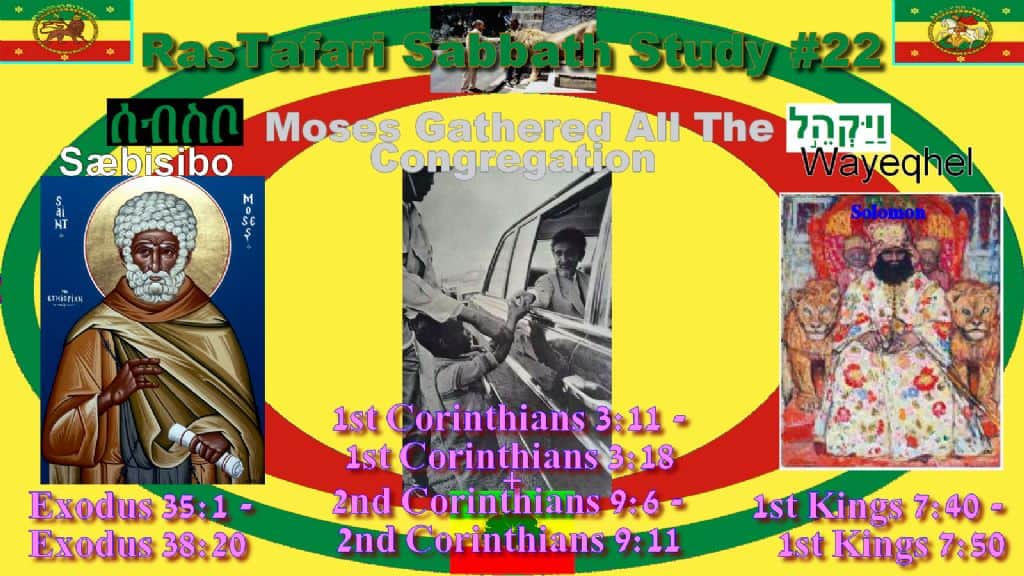
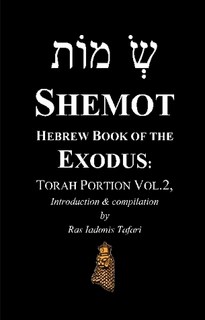
![Vayakhel | פקודי | "And he assembled- He gathered" ሰብስቦ | seb’s’bo [sebissibo] Vayakhel | פקודי | "And he assembled- He gathered" ሰብስቦ | seb’s’bo [sebissibo]](https://rastafarigroundation.org/wp-content/uploads/2019/03/Discipleship-Radi0-RasTafari-Bible-Readings-22_.jpg)
![Vayakhel | פקודי | "And he assembled- He gathered" ሰብስቦ | seb’s’bo [sebissibo] Vayakhel | פקודי | "And he assembled- He gathered" ሰብስቦ | seb’s’bo [sebissibo]](https://rastafarigroundation.org/wp-content/uploads/2019/03/Discipleship-Radi0-RasTafari-Bible-Readings-22_2_.jpg)
![Vayakhel | פקודי | "And he assembled- He gathered" ሰብስቦ | seb’s’bo [sebissibo] Vayakhel | פקודי | "And he assembled- He gathered" ሰብስቦ | seb’s’bo [sebissibo]](https://rastafarigroundation.org/wp-content/uploads/2019/03/Discipleship-Radi0-RasTafari-Bible-Readings-22_2_1.jpg)
![Vayakhel | פקודי | "And he assembled- He gathered" ሰብስቦ | seb’s’bo [sebissibo] Vayakhel | פקודי | "And he assembled- He gathered" ሰብስቦ | seb’s’bo [sebissibo]](https://rastafarigroundation.org/wp-content/uploads/2019/03/Discipleship-Radi0-RasTafari-Bible-Readings-22_2.jpg)
![Pekudei | ויקהל | "Accountings of- Countings" እቃ ድምር ይህ ነው | ‘Iqa d’m’r [y’h’new] Pekudei | ויקהל | "Accountings of- Countings" እቃ ድምር ይህ ነው | ‘Iqa d’m’r [y’h’new]](https://rastafarigroundation.org/wp-content/uploads/2019/03/Discipleship-Radi0-RasTafari-Bible-Readings-23_.jpg)
![Pekudei | ויקהל | "Accountings of- Countings" እቃ ድምር ይህ ነው | ‘Iqa d’m’r [y’h’new] Pekudei | ויקהל | "Accountings of- Countings" እቃ ድምር ይህ ነው | ‘Iqa d’m’r [y’h’new]](https://rastafarigroundation.org/wp-content/uploads/2019/03/Discipleship-Radi0-RasTafari-Bible-Readings-23_2_.jpg)
![Pekudei | ויקהל | "Accountings of- Countings" እቃ ድምር ይህ ነው | ‘Iqa d’m’r [y’h’new] Pekudei | ויקהל | "Accountings of- Countings" እቃ ድምር ይህ ነው | ‘Iqa d’m’r [y’h’new]](https://rastafarigroundation.org/wp-content/uploads/2019/03/Discipleship-Radi0-RasTafari-Bible-Readings-23_2_1.jpg)
![Pekudei | ויקהל | "Accountings of- Countings" እቃ ድምር ይህ ነው | ‘Iqa d’m’r [y’h’new] Pekudei | ויקהל | "Accountings of- Countings" እቃ ድምር ይህ ነው | ‘Iqa d’m’r [y’h’new]](https://rastafarigroundation.org/wp-content/uploads/2019/03/Discipleship-Radi0-RasTafari-Bible-Readings-23_2.jpg)
